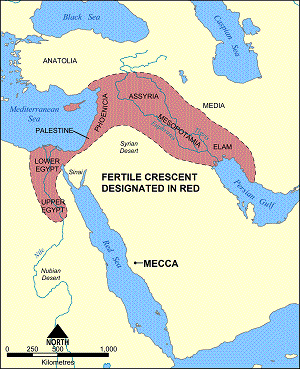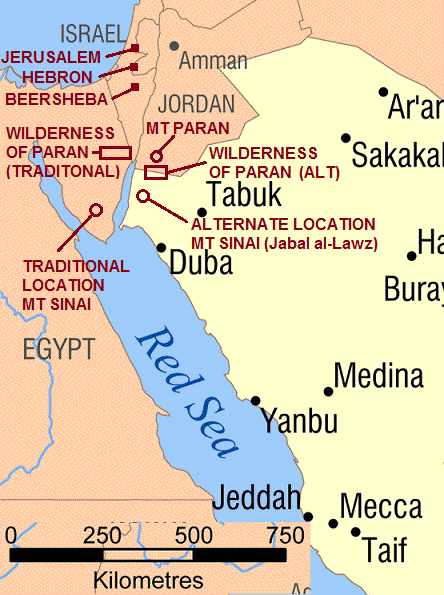new page
http://www.petewaldo.com/12_sons_tribes_ishmael.htmGen 25:13 And these [are] the names of the sons of Ishmael, by their names, according to their generations: the firstborn of Ishmael, Nebajoth; and Kedar, and Adbeel, and Mibsam, 14 And Mishma, and Dumah, and Massa, 15 Hadar, and Tema, Jetur, Naphish, and Kedemah: 16 These [are] the sons of Ishmael, and these [are] their names, by their towns, and by their castles; twelve princes according to their nations. 17 And these [are] the years of the life of Ishmael, an hundred and thirty and seven years: and he gave up the ghost and died; and was gathered unto his people. 18
And they dwelt from Havilah unto Shur, that [is] before Egypt, as thou goest toward Assyria: [and] he died in the presence of all his brethren.
The tribes of Ishmael inhabited a region "... from Havilah unto Shur, that [is] before Egypt, as thou goest toward Assyria...".
[map added 4-5-14]

The traditional presumed location of the Wilderness of Shur is above the upper left of this satellite image, however according to a later suggested location of Mt. Sinai, the wilderness of Shur may instead be in the location detailed on the following map from the
web site bible.ca, to the east of the Gulf of Aqaba.
http://www.andrews.edu/archaeology/archive/merling/newpage5.htm
The traditional location, as indicated on the following map
from the andrews.edu web site, is even much further from where Mecca was eventually established, in
about the 4th century AD.
 http://www.bible.ca/archeology/bible-archeology-exodus-route-wilderness-of-shur-ishmaelites-midianites-amalekites.htm
http://www.bible.ca/archeology/bible-archeology-exodus-route-wilderness-of-shur-ishmaelites-midianites-amalekites.htm"... from Havilah unto Shur, that [is] before Egypt,
as thou goest toward Assyria..."

The territory is described "....as thou goest toward Assyria..." perhaps akin to saying "by way of Assyria".
as thou goest
Old Testament Hebrew Definition:
0935 bow' {bo}
a primitive root; TWOT - 212; v
AV - come 1435, bring 487, ... in 233, enter 125, go 123, carry 17,
...down 23, pass 13, ...out 12, misc 109; 2577
1) to go in, enter, come, go, come in
As indicated on the top map above, the center of the territory of the tribes of Ishmael would have likely been north of the harsh Syrian and Arabian deserts - toward Assyria - and in the "fertile crescent" in which
Abraham traveled. Particularly since the tribes of Kedar and Nebaioth were known for their flocks of sheep.
Isaiah 60:7 All the flocks of Kedar shall be gathered together unto thee, the rams of Nebaioth shall minister unto thee: they shall come up with acceptance on mine altar, and I will glorify the house of my glory.

Syrian Desert
http://en.wikipedia.org/wiki/Syrian_DesertWe know more about
Ishmael's son Nabajoth, than perhaps any other, which may have become the Nabataeans. From the preceding link:
"... Assyrian records tell us of King Ashurbanipal (668-663 BC) who was fighting with the 'Nabaiateans of Arabia.'" A thousand kilometers from Mecca, a thousand years before it was established, and still before history tells us the first caravan was ever able to travel from North to South along the Red Sea Arabia.
"... from Havilah unto Shur, that [is] before Egypt, as thou goest
toward Assyria:"
Map of Assyria around 1100 BC
at this web site.
Map of Assyria in 824 BC in dark green and 671 BC in light green.
http://en.wikipedia.org/wiki/File:Map_of_Assyria.png
We can see from the maps that in Ishmael's day in around 1,000 BC, Assyria, who the Nabaiateans were fighting hundreds of years later, was still well over 1000 kilometers from where Mecca is located today. So how or why would Ishmael have been living in Mecca,
about 1400 years before it was established, and over a 1,000 kilometers away from where his sons lived?
(link)
The Tribe of Nabajoth
Sixteen hundred years after Ishmael roamed the earth and 1200 kilometers away from the Holy Land of the prophets and patriarchs, a Meccan named Ibn Ishak, the earliest reporter of Muhammad's life, declared that Muhammad came from the Ishmaelite tribe of Nabajoth. While many of Muhammad's Middle Eastern followers may have traces of the seed of the lost tribes of Ishmael in their ancestry, since Muhammad's tribe
the Quraish immigrated to Mecca from Yemen Muhammad was
more likely Kush*te, since the historical and linguistic evidence suggests that Southern Arabia was settled by Ethiopians that migrated across the strait.
"Like all other Semitic languages, Arabic is the descendant of a so-called "Proto-Semitic" language, which is currently believed to have
developed in East Africa and which never evolved in a written form. Arabic and Amharic, the two most recent Semitic languages, both arose in the mid-300s."
(link)
Tribe of Kedar
Muhammad's followers will sometimes lay claim to Kedar, but from what we know about the Kedarites it isn't anything to boast about.
The Twelve Lost Tribes of Ishmael"Nehemiah's opponent, 'Geshem the Arab' has been identified as one of the kings of Kedar from the mid fifth century BC. (based on a number of North Arabian inscriptions)
Regarding their religion, Assyrian inscriptions tell us that Sennacherib captured of several Arabian deities in the Kedarite city of Dumah. The chief deity was Atarsamain, or the morning star of heaven. (the counterpart of Mesopotamian Ishtar). The tribal league led by the Kedarites was known as "the confederation of Atarsamain, and their cult was led by a series of queen-priestesses in Dumah. The rest of their pantheon of gods consisted of Dai, Nuhai (Nuhay), Ruldai (Ruda), Abirillu, and Atarquruma. Rock graffiti in the Thamudic language reveals that Ruda was known as the evening star, and Nuhay was the sun-god, and they were worshiped in addition to Atarsamain 'the morning star.' Herodotus, in the fifth century BC identified two deities worshiped among the Arabs, as a fertility god called Orotalt (perhaps Ruda, as identified by Macdonald in North Arabian in the First Millennium BC, 1360), and
a sky goddess know as Allat. (Herodotus III,3.) Later Allat became referred to in the masculine form as Allah)"
Ishmael ".... died in the presence of all his brethren". Did Isaac and Jacob live in Mecca too?

Once again indicating the value of Islamic so-called "tradition", that masquerades as thousands of years of pre-Muhammad history, the entirety of which was put to the pen in the 7th through 9th centuries AD, without reference to any actual historical record from before the 6th century AD. Yet Muhammad's followers believe it as though it were actual history - even including notions like
Muhammad's unwitnessed night journey - even though a bunch of 7th - 9th century SW Arabian desert dwellers could not have had the first clue, as to what went on thousands of years before them, and over a thousand kilometers away, in the Holy Land of the prohets and patriarchs.
It isn't too late. You can begin a relationship, with the one true God of love
YHWH, as He expressed Himself through His Messiah. All you have to do is ask
Yeshua (means Yahweh saves), Jesus Christ, to come into your heart and life.
Matthew 7:7 Ask, and it shall be given you; seek, and ye shall find; knock, and it shall be opened unto you: 8 For every one that asketh receiveth; and he that seeketh findeth; and to him that knocketh it shall be opened.
John 3:3 Jesus answered and said unto him, Verily, verily, I say unto thee, Except a man be born again, he cannot see the kingdom of God.
John 14:6 Jesus saith unto him, I am the way, the truth, and the life: no man cometh unto the Father, but by me.
twelve tribes of ishmael
http://www.balaams-ass.com/alhaj/twelvetribesofishmael.htmLet alone that Muhammad himself couldn't have been a descendent of Ishmael.
http://islamchristianforum.com/index.php?topic=1216.0